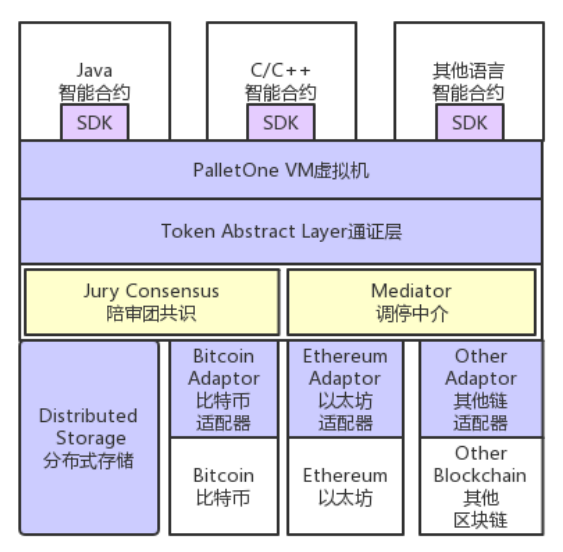-
Cryptocurrencies
-
Exchanges
-
Media
All languages
PalletOne is a distributed cross-chain protocol decoupled from the underlying blockchain.
PalletOne allows users to transfer value between chains. In order to drive PalletOne technology, users can use PalletOne tokens and use them as transaction fees for the jury; at the same time, users can deploy PalletOne nodes as jurors to participate in consensus. Get PalletOne tokens as rewards.
Introduction to PalletOne
PalletOne (Protocol for Abstract-Level Ledger Ecosystem) proposes an effective way to simultaneously solve the problems of scalability, interoperability, user-friendliness, and platform lock-in.
In PalletOne, the consensus mechanism adopts the jury consensus mechanism. The smart contract only needs a group of verifiers to verify and execute. These verifiers are called jurors, and they form a jury. Through the jury consensus protocol, PalletOne completely decouples the smart contract from the underlying blockchain to realize cross-chain value exchange. Mediator (mediation intermediary) is responsible for the security of PalletOne network and is the core component of PalletOne. PalletOne VM is the core tool for smart contract compilation and execution, and is a key part of PalletOne's multi-platform and multi-language support. In order to improve the security of smart contracts for token definitions, the PalletOne token abstraction layer defines a definition set and an operation set for tokens.
The structure and components of PalletOne are shown in the figure.

Token Economy
Token as deposit
In order to ensure the security of the PalletOne system, jurors must pay a deposit to avoid fraud. To become a juror to earn transaction fees, participants need to follow the following process:
(1) Pay a part of PalletOne token as a deposit to become a candidate juror.
(2) Jurors earn transaction fees by executing contracts.
(3) After the contract is executed, the jury will be disbanded, and the candidate jurors can choose to withdraw the deposit and withdraw from the list of candidate jurors.
(4) Jurors can also withdraw their bond by calling Mediator to choose a new replacement juror.
The amount of the bond can be determined by a model that includes different properties, including contract value, jury size, juror creditworthiness, and contract design. Jurors must ensure that they have a good host environment and network environment. A poor host environment may cause the smart contract to fail to execute within the specified time, while a poor network environment may cause the communication between jurors in the jury to time out or even Offline, so that the smart contract cannot reach consensus on this juror. Repeated consensus failures will forfeit the security deposit and be removed from the candidate juror list.
Tokens as transaction fees
In order to provide incentives for the jury to execute contracts, in PalletOne, jurors earn transaction fees by executing contracts as smart contract executors. Contract participants need to pay jurors some PalletOne tokens as transaction fees. This transaction fee is much lower than that of other blockchains because only the jurors in the jury associated with it will execute the contract. The jury will only execute the contract after determining that the PalletOne tokens have been transferred into the Mediator.
Tokens as juror rewards
For the efficient operation of the entire PalletOne network and to encourage participation in consensus, in addition to transaction fees, Mediator will issue PalletOne tokens based on smart contracts for jurors' participation consensus excitation. Transaction fees and rewards in PalletOne are distributed to every juror involved in verifying and executing contracts. Since the jury is randomly selected, everyone has the opportunity to become a jury member and participate in the token economy.
Palletone as a contract deposit
Some contracts (such as currency trading contracts) require both parties involved to pay a certain Palletone pass as a contract deposit to the contract to avoid malicious unilateral parties A breach of contract occurs. If the contract is completed normally, the contract deposit will be returned to both parties of the contract, and if one party breaches the contract, the other party can apply to confiscate the breaching party’s contract deposit to compensate the performance party’s loss.
Application scenario
PalletOne is an exciting cross-chain project, which will be dedicated to realizing information cross-chain, value cross-chain and function cross-chain between different chain networks. The ultimate vision of PalletOne is to link all the chain networks, so that the information, value and applications that are originally closed and isolated in these chain networks can flow freely and be widely used across chains, thus building a global inter-chain network without boundaries.
Cross-chain payment
Users in the Bitcoin network want to enjoy playing Crypto Kitty in Ethereum. The most viable solution is to convert some BTC to ETH through a complex operation on a high-fee cryptocurrency exchange. Users can use PalletOne to pay fees directly by BTC, thus avoiding complicated currency exchange operations.
Financial Tools
PalletOne is the best platform to share their investment strategies. Users can create their own ETFs. Tokens in PalletOne are highly flexible. Any user can use the token tool to design tokens with multi-coins, stocks and bonds. Not only that, but PalletOne provides a comprehensive set of risk definitions and assurances to accomplish this and ensure security.
Support multiple payment types on Dapps
When users use DApps built on PalletOne, the payment method is more flexible and free: both payment can be made through PalletOne tokens, or you can choose BTC, ETH or even a random combination of several ways.
PalletOne technical advantages
Multi-chain
PalletOne smart contract supports multiple chains. Through the Jury consensus and adaptation layer, PalletOne smart contracts can run on different blockchains simultaneously. PalletOne smart contracts can interact with different blockchains at the same time, so users can trade tokens from different blockchains in one PalletOne contract call to make the inter-chain token exchange distributed, atomic and immutable.
Multi-task
PalletOne smart contract verification, execution, etc. can be done through a jury specially created for it. The jury is made up of a group of jurors randomly selected from the pool of jurors. Smart contracts in PalletOne can be implemented by selecting different juries in a multi-task manner. Compared with the whole network consensus method, PalletOne network congestion will be effectively reduced.
Security
The security of PalletOne is reflected in two aspects, one is the security of development, and the other is the security of contract execution. When a user develops a corresponding scenario contract, he/she only needs to call the standard contract and complete the DAPP development in a few steps. PalletOne VM can provide a safe and efficient sandbox operating environment for smart contracts.
Multi-language and multi-platform
PalletOne's DApp developers can use mainstream development languages to develop smart contracts without having to learn new contract development languages.
PalletOne VM is completely decoupled from the underlying operating system, which enables PalletOne smart contracts to adapt to Windows, Linux, Mac and other types of platforms.











